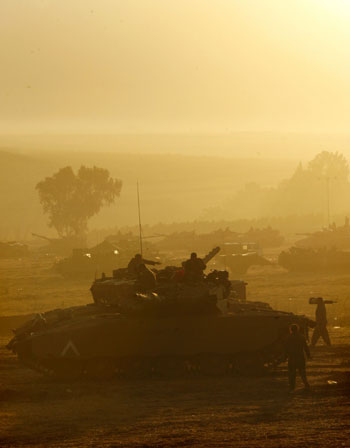
Israeli armored vehicles are silhouetted at dawn near northern town of Kiryat Shmona on Israel-Lebanon border (R)
BEIRUT (Reuters) – The United Nations said Israeli and Lebanese leaders had agreed a truce would take effect at 0500 GMT on Monday to end the month-old war, but fighting raged on Sunday as Israeli forces met fierce resistance from Hizbollah guerrillas.
Israeli jets launched scores of strikes on more than 50 villages and towns across Lebanon on Sunday, killing eight people. Hizbollah fired about 10 rockets into northern Israel, killing one person, police said.
Israel, which has stepped up its offensive in south Lebanon ahead of the truce, suffered its worst single day death toll in the war on Saturday. It said 19 soldiers were killed in the fighting and that five declared missing after a helicopter was shot down were now feared dead.
The Israeli cabinet was expected to formally approve the U.N. Security Council resolution on Sunday, and the Haaretz newspaper reported that Israel was willing to discuss a possible release of Hizbollah prisoners in exchange for freeing two captured Israeli soldiers.
In Lebanon, three civilians were killed and 13 wounded in an Israeli air raid on the village of Ali Al Nahri in the eastern Bekaa Valley, security sources said. Five people, including a mother and her three children, died when a house was struck near the southern city of Tyre, the sources said.
Artillery pounded Hizbollah-held areas in south Lebanon. Hundreds of rounds crashed into the Hizbollah stronghold of Khiam, residents said.
A rocket fired by Hizbollah killed an elderly man in a house in Yaara, northern Israel, and other rocket attacks wounded seven people, medics said.
Hizbollah reported fierce fighting in several parts of the border area and said its guerrillas destroyed at least three tanks and two bulldozers. It said guerrillas were clashing with an Israeli unit trying to reach the downed helicopter.
Almost 30,000 Israeli troops are operating in south Lebanon, Israel’s Army Radio said.
At least 1,072 people in Lebanon and 144 Israelis, including 104 soldiers, have been killed in the war, triggered on July 12 when Hizbollah guerrillas captured two Israeli soldiers in a cross-border raid.
Lebanese Prime Minister Fouad Siniora said his government unanimously approved the U.N. resolution on Saturday, and Hizbollah leader Sayyed Hassan Nasrallah said his fighters would abide by the ceasefire once Israeli forces also adhered to it.
“I am very happy to announce (Israeli Prime Minister Ehud Olmert and Siniora) have agreed that the cessation of hostilities and the end of the fighting will enter into force on 14 August at 0500 hours GMT,” Annan said in New York.
“Preferably, the fighting should stop now to respect the spirit and intent of the Security Council decision, the object of which was to save civilian lives, to spare the pain and suffering that the civilians on both sides are living through.”
The resolution envisages a phased withdrawal of Israeli troops from southern Lebanon and 15,000 Lebanese troops to deploy along with up to 15,000 U.N. peacekeeping troops.
But some analysts were cautious over chances that the fighting would stop quickly.
“I think this talk of a ceasefire going into effect tomorrow seems to be highly exaggerated and dubious,” said Mouin Rabbani, senior Middle East analyst with the International Crisis Group.
“It seems that Israel’s strategy has been to establish positions as far north as possible to implement a fighting withdrawal, meaning that they will try to take on as much of Hizbollah as they can as they work their way south.”
Nasrallah said Hizbollah would abide by the U.N. resolution and cooperate with the U.N. and Lebanese troops, but would carry on confronting any Israeli soldiers on Lebanese soil.
France is widely expected to lead the U.N. force, which will expand the existing U.N. Interim Force in Lebanon (UNIFIL) but have a stronger mandate. French Foreign Minister Philippe Douste-Blazy told Le Monde newspaper the mission of the new force would not include disarming Hizbollah by force.
A senior Israeli commander, Major General Udi Adam, said some Israeli forces had reached as far as the Litani river in Lebanon. The river is a few kilometres (miles) from the border at some points but about 20 km (13 miles) away at others.

A Lebanese man walks through the rubble of one of three buildings attacked during an Israeli air raid at the village of Ali Alnahri (AP)

Palestinians hold up Lebanese and Hamas flags during a protest in Gaza City (AFP)
